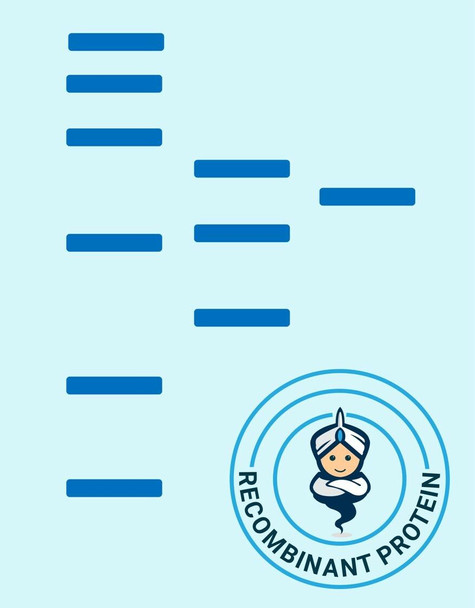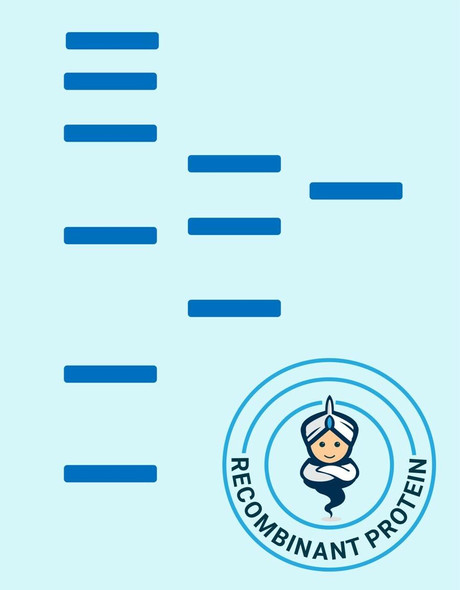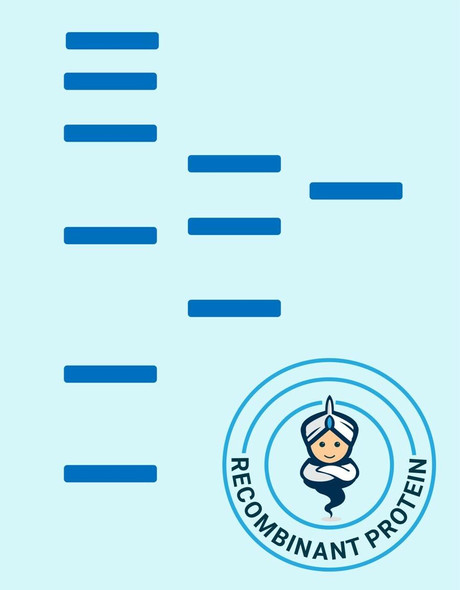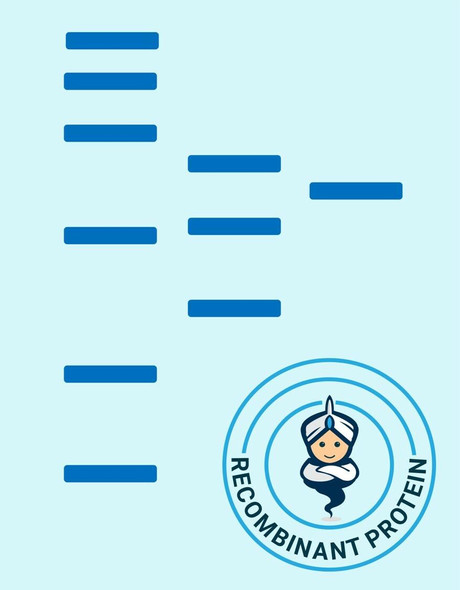Description
| Product Name: | Human p16-INK4a Recombinant Protein |
| Product Code: | RPPB2592 |
| Size: | 20µg |
| Species: | Human |
| Target: | p16-INK4a |
| Synonyms: | Cyclin-dependent kinase 4 inhibitor A, CDK4I, p16-INK4, p16-INK4a, p16INK4A, CDKN-2A, CDKN2, Multiple tumor suppressor 1, MTS1, CMM2, MLM, TP16, p16(INK4), p19. |
| Source: | Escherichia Coli |
| Physical Appearance: | Sterile Filtered White lyophilized (freeze-dried) powder. |
| Formulation: | CDKN2A was lyophilized from a concentrated (1mg/ml) sterile solution containing 1x PBS pH-7.4. |
| Solubility: | It is recommended to reconstitute the lyophilized Cyclin-dependent kinase in sterile water not less than 100�g/ml, which can then be further diluted to other aqueous solutions. |
| Stability: | Lyophilized Cyclin-dependent kinase although stable at room temperature for 3 weeks, should be stored desiccated below -18°C. Upon reconstitution Cyclin-dependent kinase should be stored at 4°C between 2-7 days and for future use below -18°C.For long term storage it is recommended to add a carrier protein (0.1% HSA or BSA).Please prevent freeze-thaw cycles. |
| Purity: | Greater than 95.0% as determined by:(a) Analysis by RP-HPLC.(b) Analysis by SDS-PAGE. |
| Amino Acid Sequence: | MEPAAGSSMEPSADWLATAAARGRVEEVRALLEAGALPNAPNSYGRRPIQVMMMGSARVAELLLLHGAEPNCADPATLTRPVHDAAREGFLDTLVVLHRAGARLDVRDAWGRLPVDLAEELGHRDVARYLRAAAGGTRGSNHARIDAAEGPSDIPD |
Cyclin-dependent kinase inhibitors (CDKIs) are proteins that bind to and inhibit the activity of CDKs. Two major classes of CDK inhibitors have been identified. The p16 family (p15, p16, p18 and p19) binds to and inhibits the activities of CDK4 and CDK6. The p21 family (p21, p27, p28 and p57) can bind to broad range of CDK-cyclin complexes and inhibit their activities. CDKIs are capable of suppressing growth, and several lines of evidence strongly suggest that at least some CDKIs may be tumor suppressor proteins.
CDKN2A Human Recombinant produced in E.Coli, it's a single non-glycosylated polypeptide chain containing 156 amino acids, approximately 16.5 kDa.CDKN2A is purified by proprietary chromatographic techniques.
| UniProt Protein Function: | Function: Acts as a negative regulator of the proliferation of normal cells by interacting strongly with CDK4 and CDK6. This inhibits their ability to interact with cyclins D and to phosphorylate the retinoblastoma protein. Ref.11 Ref.13 |
| UniProt Protein Details: | Subunit structure: Heterodimer with CDK4 or CDK6. Predominant p16 complexes contained CDK6. Interacts (isoforms 1,2 and 4) with CDK4 (both 'T-172'-phosphorylated and non-phosphorylated forms); the interaction inhibits cyclin D-CDK4 kinase activity. Interacts with ISCO2. Ref.13 Ref.14 Subcellular location: Cytoplasm. Nucleus Ref.14. Tissue specificity: Widely expressed but not detected in brain or skeletal muscle. Isoform 3 is pancreas-specific. Ref.2 Post-translational modification: Phosphorylation seems to increase interaction with CDK4. Involvement in Disease: The association between cutaneous and uveal melanomas in some families suggests that mutations in CDKN2A may account for a proportion of uveal melanomas. However, CDKN2A mutations are rarely found in uveal melanoma patients.Melanoma, cutaneous malignant 2 (CMM2) [MIM:155601]: A malignant neoplasm of melanocytes, arising de novo or from a pre-existing benign nevus, which occurs most often in the skin but also may involve other sites.Note: Disease susceptibility is associated with variations affecting the gene represented in this entry. Ref.24 Ref.27 Ref.29 Ref.30 Ref.31 Ref.32 Ref.34 Ref.36 Ref.38 Ref.39 Ref.41 Ref.42Familial atypical multiple mole melanoma-pancreatic carcinoma syndrome (FAMMMPC) [MIM:606719]: An inherited cancer predisposition syndrome characterized by an increased risk of developing malignant melanoma and/or pancreatic cancer. Mutation carriers within families may develop either or both types of cancer.Note: The disease is caused by mutations affecting the gene represented in this entry.Li-Fraumeni syndrome (LFS) [MIM:151623]: Autosomal dominant familial cancer syndrome that in its classic form is defined by the existence of a proband affected by a sarcoma before 45 years with a first degree relative affected by any tumor before 45 years and another first degree relative with any tumor before 45 years or a sarcoma at any age. Other clinical definitions for LFS have been proposed (PubMed:8118819 and PubMed:8718514) and called Li-Fraumeni like syndrome (LFL). In these families affected relatives develop a diverse set of malignancies at unusually early ages. Four types of cancers account for 80% of tumors occurring in TP53 germline mutation carriers: breast cancers, soft tissue and bone sarcomas, brain tumors (astrocytomas) and adrenocortical carcinomas. Less frequent tumors include choroid plexus carcinoma or papilloma before the age of 15, rhabdomyosarcoma before the age of 5, leukemia, Wilms tumor, malignant phyllodes tumor, colorectal and gastric cancers.Note: The disease is caused by mutations affecting the gene represented in this entry. Ref.35Melanoma-astrocytoma syndrome (MASTS) [MIM:155755]: Characterized by a dual predisposition to melanoma and neural system tumors, commonly astrocytoma.Note: The disease is caused by mutations affecting the gene represented in this entry. Ref.37 Sequence similarities: Belongs to the CDKN2 cyclin-dependent kinase inhibitor family.Contains 4 ANK repeats. Sequence caution: The sequence AAB60645.1 differs from that shown. Reason: Erroneous initiation. |
| NCBI Summary: | This gene generates several transcript variants which differ in their first exons. At least three alternatively spliced variants encoding distinct proteins have been reported, two of which encode structurally related isoforms known to function as inhibitors of CDK4 kinase. The remaining transcript includes an alternate first exon located 20 Kb upstream of the remainder of the gene; this transcript contains an alternate open reading frame (ARF) that specifies a protein which is structurally unrelated to the products of the other variants. This ARF product functions as a stabilizer of the tumor suppressor protein p53 as it can interact with, and sequester, the E3 ubiquitin-protein ligase MDM2, a protein responsible for the degradation of p53. In spite of the structural and functional differences, the CDK inhibitor isoforms and the ARF product encoded by this gene, through the regulatory roles of CDK4 and p53 in cell cycle G1 progression, share a common functionality in cell cycle G1 control. This gene is frequently mutated or deleted in a wide variety of tumors, and is known to be an important tumor suppressor gene. [provided by RefSeq, Sep 2012] |
| UniProt Code: | P42771 |
| NCBI GenInfo Identifier: | 3041660 |
| NCBI Gene ID: | 1029 |
| NCBI Accession: | P42771.2 |
| UniProt Secondary Accession: | P42771,O95440, Q15191, Q5VVJ5, Q96B52, Q9NP05, A5X2G7 D3DRK1, |
| UniProt Related Accession: | P42771,Q8N726 |
| Molecular Weight: | |
| NCBI Full Name: | Cyclin-dependent kinase inhibitor 2A, isoforms 1/2/3 |
| NCBI Synonym Full Names: | cyclin-dependent kinase inhibitor 2A |
| NCBI Official Symbol: | CDKN2A�� |
| NCBI Official Synonym Symbols: | ARF; MLM; P14; P16; P19; CMM2; INK4; MTS1; TP16; CDK4I; CDKN2; INK4A; MTS-1; P14ARF; P19ARF; P16INK4; P16INK4A; P16-INK4A�� |
| NCBI Protein Information: | cyclin-dependent kinase inhibitor 2A; CDK4 inhibitor p16-INK4; multiple tumor suppressor 1; cell cycle negative regulator beta; cyclin-dependent kinase 4 inhibitor A; cyclin-dependent kinase inhibitor 2A (melanoma, p16, inhibits CDK4) |
| UniProt Protein Name: | Cyclin-dependent kinase inhibitor 2A, isoforms 1/2/3 |
| UniProt Synonym Protein Names: | Cyclin-dependent kinase 4 inhibitor A; CDK4I; Multiple tumor suppressor 1; MTS-1; p16-INK4a |
| UniProt Gene Name: | CDKN2A�� |
| UniProt Entry Name: | CD2A1_HUMAN |








